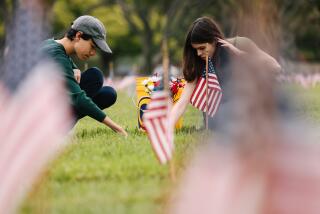Lives remembered: California’s war dead profiled
- Share via
They were young and full of promise and they came running from throughout California when their nation beckoned after the Sept. 11 terrorist attacks.
For many, enlisting in the military had long been their dream. For others, it was a decision that caught their family and friends by surprise.
When they deployed to Iraq or Afghanistan, they tried to hide the brutal truth of war from their families. But then came a knock on the door from Marines, soldiers, sailors or airmen bearing regrets from the president of the United States.
Their families are proud of their service, but for them every day is Memorial Day, a day of remembrance -- and tears.
When Sgt. Luis Montes, 22, of El Centro was buried, the Army made sure his mother received his Purple Heart and Bronze Star. He died of burns suffered while trying to pull two buddies from a burning tank in Iraq. “I didn’t want medals,” Marisela Montes said. “I wanted a son. But I don’t have my son, I have his medals.”
The Times has tried to provide an obituary for all military personnel from California killed in the wars in Iraq and Afghanistan.
As Memorial Day is set to be observed, that figure stands at 492. It does not include several hundred military personnel who, although they may have been stationed in California for years, still appeared to call another state home.
Across the nation, more than 4,600 have died while in service to the country. Of the California dead, the median age was 23. Their deaths left 205 widows and three widowers, and 300 children who will grow up without their fathers, two without their mothers. Thirty-eight of the 492 were engaged.
About 67% were in the Army, Army National Guard or Army Reserve; 27% in the Marine Corps or Marine Corps Reserve. The Air Force accounted for 2%, the Navy and Navy Reserve for 4%. Two percent of those killed were women.
At least 59 were immigrants. The state’s two largest cities, Los Angeles and San Diego, have had the most casualties, but statistics suggest that, per capita, the sacrifice has fallen more heavily on smaller cities, suburbs and farm towns.
The high schools with the most graduates killed are in Clovis (six), Hemet (five) and Simi Valley (four).
But numbers alone are a woeful way to describe the continuing death toll. Each death leaves dreams unfulfilled.
Army Spc. Jose R. Perez, 24, wanted to open a barbershop in his hometown of Ontario. He was killed by a sniper in Ramadi, west of Baghdad. He left a wife, Izabel, and 4-year-old son, Jose Jr.
Army Sgt. Dale Brehm, 23, of Turlock wanted to build a house for his family. He was killed in a firefight in Ramadi two weeks before he was scheduled to leave Iraq.
Marine Cpl. Carlos Arellano, 22, of Rosemead hoped to join the Los Angeles Police Department. “He figured the Marines would be something that would open a lot of doors,” said his brother, Marco. Instead, Arellano was killed by a suicide bomber. The pictures he had sent home often showed him surrounded by Iraqi children.
The children of Iraq, who trail U.S. personnel everywhere, laughing and grinning, figure prominently in the letters and phone calls of Marines and soldiers killed there.
Army Pfc. Casey M. LaWare, 19, of Redding wrote to a cousin that his greatest enjoyment in Iraq was giving candy to the children. He died of burns incurred while in a guard tower.
Marine Pfc. Javier Chavez Jr., 19, of Cutler wrote his wife, Janie, that when he patrolled near Fallouja, the Iraqi adults were silent and unfriendly but the children held his hand and walked beside him. “He would give them candy,” she said.
Chavez was killed when he stepped on a land mine.
The cliche is that the young believe they’ll live forever. But for personnel in a war zone or on the verge of being deployed, premonitions of death are not uncommon.
Kelsey Johnson remembered that her husband, Marine Cpl. Stephen P. Johnson, 24, told her that he had “a really bad feeling” about an upcoming mission. Johnson, of Yreka, was among 31 troops killed when their helicopter crashed in the Iraqi desert.
“I dropped down on the ground and started screaming,” she said. She was 19 when her husband was killed.
Army Pvt. Walter Freeman Jr. of Lancaster put a picture of Jesus on his MySpace.com page and asked people to pray for him.
His sister, Donna Brown, recounted one of the last things he told her: “If you never believed in God, wait until you come to Iraq. You will.”
Freeman, 20, was killed by a roadside bomb.
Many soldiers and Marines left instructions for their funerals. Some wanted bagpipes. One requested, and got, “Stairway to Heaven.”
Army Spc. Daniel F. Reyes told his mother that if he died, he wanted to be buried next to his brother, Roberto Esparza, who was 21 when he was killed in a bike accident in San Diego.
Reyes was survived by his wife, Rebekah, 23, and year-old son, Daniel Fernando. “He was always thinking of us,” she said. “He called me every morning in Iraq.”
Like many of those killed, the severity of Reyes’ wounds from an explosion precluded an open-casket service. Mortuary affairs personnel in the war zones have developed a word for such cases: unviewable.
To keep his family from worrying, Marine Lance Cpl. Salvador Guerrero, 21, told them that he was training in Japan. They learned the truth when three Marines came to the family home in Whittier to inform them that he had been killed west of Baghdad.
Marine Lance Cpl. Michael Probst, 26, of Irvine asked his family to send him a cross to add to his dog tags for luck. Three days after it arrived, he was killed outside Abu Ghraib.
Among the more common themes in the obituaries is that the deceased was known for his sense of humor. “Wherever he was, he was always trying to make somebody laugh,” said Robin Butterfield of Clovis, whose son, Lance Cpl. Tony Butterfield, 19, was killed in Iraq with three other Marines.
“He was just a happy-go-lucky kid who had big dreams in a neighborhood that’s economically depressed,” a school principal said of Army Pfc. Ramon A. Villatoro Jr., 19, of Bakersfield, who died when a bomb exploded near his Bradley fighting vehicle in Baghdad.
Families are often left with fragmentary facts that add to their pain. He was killed just days before he would have come home. And echoing a theme repeated in many obituaries, he volunteered for duty in Iraq because he didn’t want to let down the guys in his outfit.
Army Sgt. Andres J. Contreras, 23, of Huntington Park changed seats with a soldier while patrolling Baghdad in a Humvee. Contreras, who wanted to become a Los Angeles County sheriff’s deputy, was killed by a roadside bomb. The other soldier survived.
Death’s timing can be particularly cruel.
Rhona Kiser of Redding learned of the death of her son, Army National Guard Sgt. Timothy Kiser, the same day his Mother’s Day card arrived. Kiser, 37, was killed in Kirkuk.
The family of Army Staff Sgt. Jason Paton, 25, of Poway learned of his death on the day that his wedding invitations arrived. His second tour in Iraq had been extended as part of the “surge.” He was killed in a Black Hawk helicopter crash.
“He was always trying to make life a little bit easier for everybody else,” said his stepfather, Jim Valenzuela -- a comment that could apply to all 492, all of whom were volunteers in their nation’s service.
More to Read
Sign up for Essential California
The most important California stories and recommendations in your inbox every morning.
You may occasionally receive promotional content from the Los Angeles Times.













